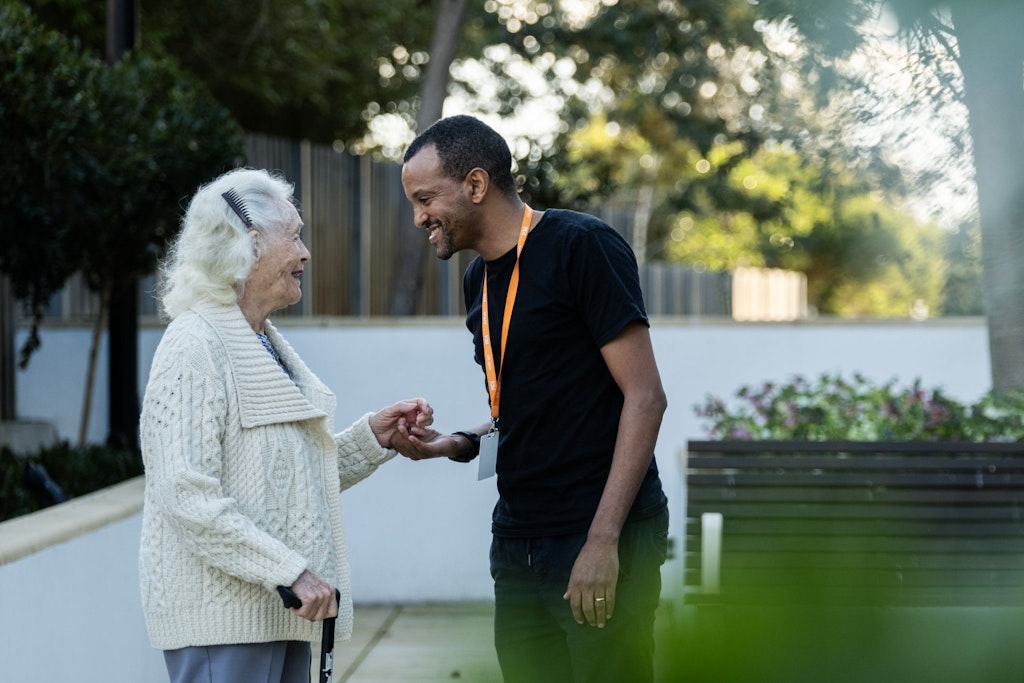Understanding behaviours: The impact of embracing dementia education
Last updated on 13 February 2025

With dementia’s prevalence expected to almost double over the next 30 years, there’s a concerted effort within the aged care sector to increase training and education opportunities for aged care workers.
Government data from 2023 reveals that just one-third of staff completed dementia care training within a 12-month window.
These low rates contributed to the government’s National Dementia Action Plan 2024-2034. The Plan aims to help develop and implement more dementia training opportunities for health and aged care workers.
This is critical as an estimated 812,500 people will be living with dementia by 2054, up from over 421,000 today.
Melbourne aged care provider Emmy Monash has embraced the chance to educate and upskill its staff to ensure residents receive an enhanced care experience that meets all their care needs.
Emmy Monash Registered Nurse and IPC Lead Dorothy Mpakame participated in Dementia Australia’s Understanding Behaviour Changes last year.
She said her interest in dementia education was sparked by a desire to gain the latest knowledge to help her provide high-quality care for residents living with dementia.
“The course was very informative, the content was very relevant and l have gained a lot from it. I am now putting into practice what l have learnt from this course, delivering holistic care and person-centred care to the people living with dementia,” Ms Mpakame explained.
Dementia Australia’s Understanding Behaviour Changes course is designed to upskill staff with an in-depth understanding of causes, signs and strategies for behaviour change in people living with dementia, so they can reduce changes and their negative impacts.
It uses a CAUSEd model (Communication, Activity, Unwell/Unmet Needs, Story, Environment and dementia) and coaching methods to unlock new perspectives and solutions.
Among the most enlightening learnings was the exploration of how family and informal carers play a role in helping staff care for residents.
“Dementia care not only involves the residents but also their loved ones and families. If you want to achieve and manage the behaviours for the residents living with dementia, the whole team needs to work together to achieve the common goal.”
She also touched on the importance of multidisciplinary training and education, highlighting how dementia care filters through most daily tasks in aged care.
“This training included staff from the catering team, lifestyle team and clinical team – so each department has gained a better understanding of how to support residents living with dementia,” she said.
“It might be during concert sessions, activities, mealtimes or when providing ADLs (activities of daily living); it encompasses a holistic approach thereby enhancing the quality of life for our residents.
“Staff who participated in the UBC training can identify the contributing factors/triggers to behaviour change and implement the support strategies to reduce the risk of behaviour changes and/or respond to them,” Ms Mpakame added.
“Participants can also mentor the other staff members. It also increases their knowledge and raises awareness about dementia in the care industry.”
Under the strengthened Aged Care Quality Standards, which will come into effect alongside the new Aged Care Act from July 1, providers must ensure their workers regularly receive competency-based training.
This not only includes caring for people living with dementia, but also the delivery of person-centred, rights-based care, and culturally safe, trauma-aware and healing-informed care.
Ms Mpakame knows the new skills and knowledge Emmy Monash staff have gained will result in a deeper connection with residents living with dementia.
“Staff have always considered a resident’s past lifestyle and history when delivering care, and this training reinforces the merits of this approach. By deepening their understanding of residents’ backgrounds and personal experiences, staff can better identify triggers for behavioural changes and tailor their responses accordingly,” she explained.
“This holistic knowledge enhances residents’ well-being and helps maintain their dignity, confidence, and self-esteem.”
With the uptake of dementia training insufficient across the board in aged care, engaging in modern training options is critical for aged care providers, staff and residents.
As Ms Mpakame explained, “Well-trained staff are better equipped to provide high-quality care, which enhances the overall experience for the residents and ensures their care needs are met.” She urges all providers to embrace available training opportunities.
“I personally think it is important for aged care organisations to seek out additional dementia training because if staff are trained on managing the behaviours of people living with dementia, there will be fewer high-risk incidents, lower rates of inappropriate use of medication and more positive staff attitudes and morale,” she said.
“This ultimately results in better service delivery and quality of life for people living with dementia. It can also benefit the wider system by reducing hospital admissions or additional healthcare usage.”